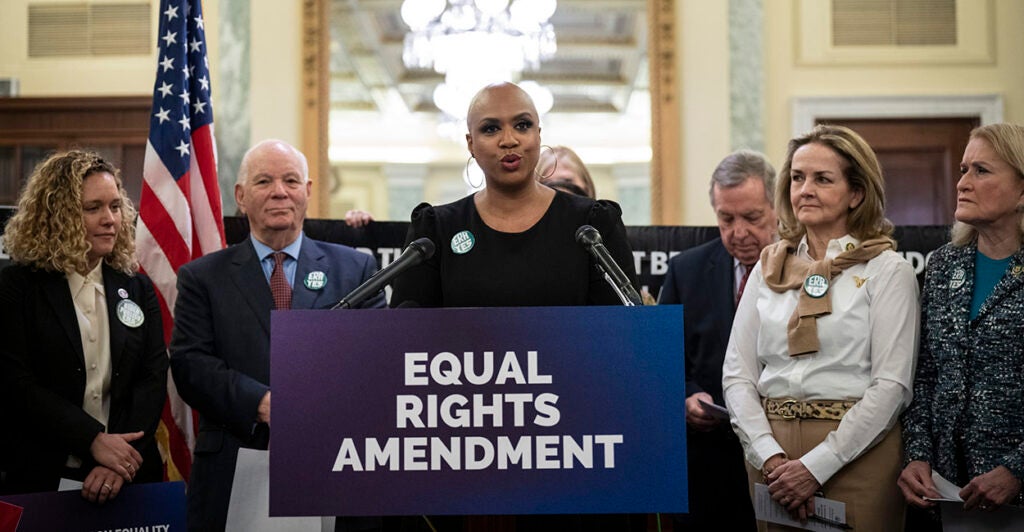Like the resilient undead, the Equal Rights Amendment is back. This time, the ERA has emerged from its grave in the form of a joint House and Senate resolution to remove the expiration date on the constitutional amendment. (Yes, the one that already expired in 1982.)
The Senate Judiciary Committee is scheduled to hold its first hearing Tuesday on scrapping the ERA’s expiration date.
So, why bring back the ERA now? The answer is simple. When the Supreme Court overturned Roe v. Wade in June, the justices certified that the U.S. Constitution doesn’t provide a right to abortion.
Since then, those on the radical Left have worked tirelessly to enshrine abortion in federal regulations and state law. Of course, their goal is to find a “right” to abortion in the Constitution.
This is where the Equal Rights Amendment comes in. Democrats (and a few Republicans) introduced a joint House and Senate resolution to remove the 1982 expiration date from the ERA. If adopted, it means Democrats would have an unlimited time horizon to ratify the ERA as part of the Constitution.
The Equal Rights Amendment states that “equality of rights under the law shall not be denied or abridged by the United States or by any State on account of sex.”
The problem is that this approach treats all legal distinctions between men and women as a form of discrimination. This is silly. For instance, only women can have babies; men can’t.
Women have the distinct potential to conceive, carry, and bear children from and through their own body. This doesn’t mean that every mother will birth her own child. It means her body, apart from a natural age limit, illness, or injury, could do so.
Our laws should reflect this distinction and protect the lives of both the mother and the unborn baby.
Since the 1970s, supporters of the ERA accomplished almost every one of its aims legislatively. (Women in the draft is a notable exception.)
The Supreme Court’s June 24 decision in Dobbs v. Jackson Women’s Health Organization, which concluded no “right” to abortion exists in the Constitution, throws a good wrench in this.
Since then, Democrats have looked for new ways to secure an absolute right to abortion. If Congress votes to remove the expiration date of the Equal Rights Amendment, and if the amendment is ratified later by the specified number of states, then the ERA could anchor a supposed right to abortion in the Constitution itself.
Democrats argue that if a man has the right to “not be pregnant,” then women also should have the right to “not be pregnant” through abortion. This isn’t hearsay. In 2019, the National Organization for Women argued that the ERA would provide a constitutional basis for abortion.
Proof of this danger to the unborn lies in outcomes for ERA-style measures at the state level. New Mexico, for example, ratified an equal rights amendment in its state constitution. In 1998, the New Mexico Supreme Court found that the state’s ERA not only secured a right to abortion, but taxpayer-funded abortion at that.
To protect the lives of women and their unborn children, lawmakers must oppose the national Equal Rights Amendment.
As Douglas Johnson, former federal legislative director for National Right to Life, pointed out: “These five judges [in the New Mexico case] in effect ruled that the state may not recognize any difference between a man’s enlarged prostate gland and an unborn child. By that cold-blooded logic, even restrictions on late-term abortions or parental consent laws would be a form of illegal sex discrimination.”
Lawyers could claim, as they did in New Mexico, that laws must treat “similarly situated people,” such as men and women, the same. This, however, is the error of the Equal Rights Amendment. It would not recognize legitimate distinctions between men and women.
Instead, the ERA would enforce “sameness” in the name of equality. This sameness would harm women and threaten the lives of countless unborn children.
Not only could the Equal Rights Amendment create a constitutional basis for abortion, it also could challenge states’ existing pro-life laws. The pro-life movement would be back at square one: fighting to reverse an erroneous right to abortion in the Constitution.
Right now, congressional Democrats are pushing to remove the expiration date from the ERA. This is the first step in passing this radical amendment to the Constitution.
For those who want to protect the lives of unborn babies, opposing this resolution stripping the expiration date from the Equal Rights Amendment is the right place to start.
Lawmakers must stand firm against those in favor of ratifying the ERA. Its “right” to kill an unborn baby is no right at all.
Have an opinion about this article? To sound off, please email letters@DailySignal.com and we’ll consider publishing your edited remarks in our regular “We Hear You” feature. Remember to include the url or headline of the article plus your name and town and/or state.
